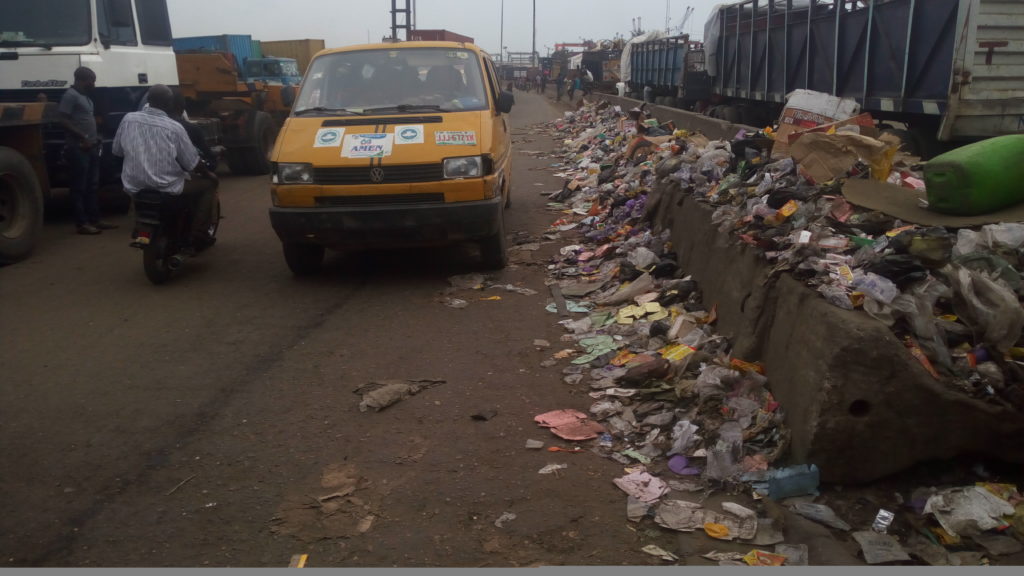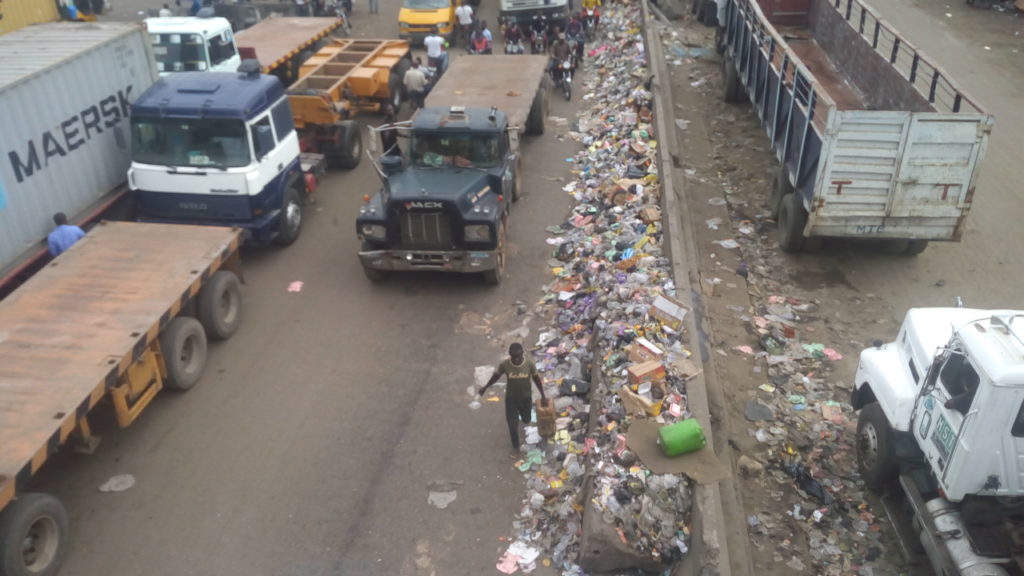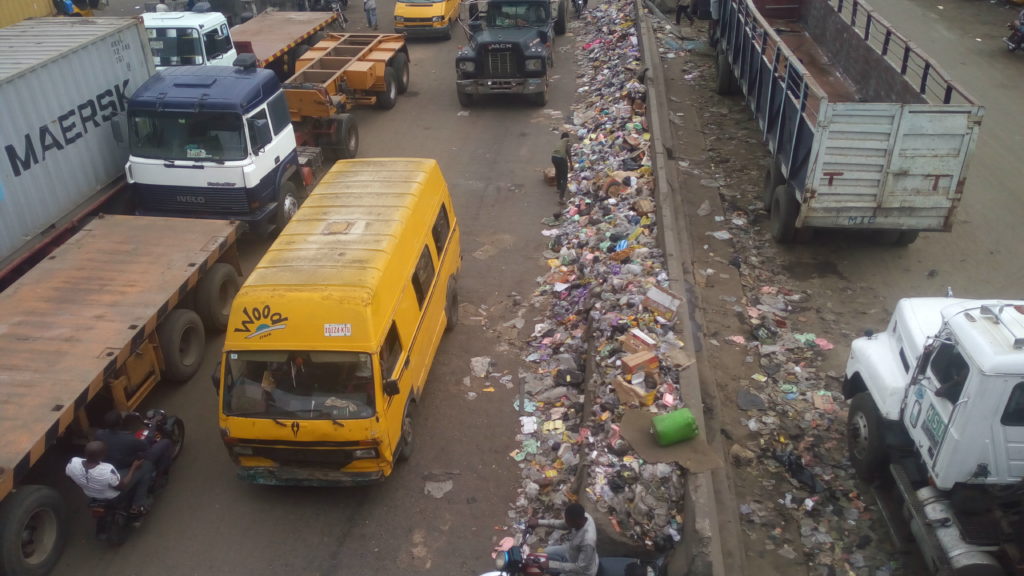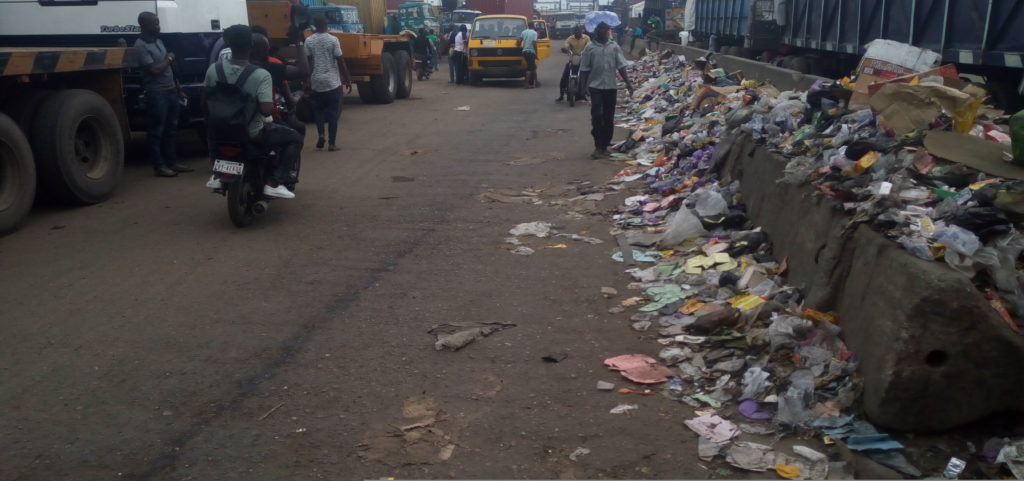Crawling through years of abandonment, the Tin Can Island Port access road has finally become a dumpsite, having deteriorated from a buzzing port road to a truck dumping ground, SAMSON ECHENIM writes.
The current state of the Tin Can Island Port end of the Oshodi-Apapa Expressway leaves much to be desired and conveniently fitting in as a replica of national shame.
Years of abandonment by the federal government has left the road which leads to West Africa’s second largest seaport to the unmerciful hands of traders and hawkers trading around the port complex, who now dump their refuse indiscriminately on the road forming couples of heaps of garbage and refuse dumps on the road, which is currently laced with near irreparable gullies.
From frequent traffic gridlock, where hundreds of thousands of manhours are lost daily, having become one half a truck park, the road after suffering multiples of gullies that the contractor refused to repair for lack of government funding, eventually packed up.
People doing business in the port, including government agency officials now have only one means to get to the port —commercial motorcycle, popularly known as okada.
The Federal Government had since 2008 contracted the rehabilitation of the affected portion of the road to Borini Proni, but the contractor alleged that the government refused to release funds to the contractor, which is handling the culpable portion of the road spanning from Sunrise Bus Stop to the Liverpool Bridge and a trailer park near the bridge.
“Government can no longer continue to pay deaf ears to the cries of the people. It cannot continue to pretend that things are okay around here. We have been paying so much to get to work everyday on this road for okada. We now pay as high as N300 for a distance that should have cost N50 by bus,” said Vincent Ukoha, who works with a shipping company.
“This is the only country where you will see a seaport road in a state like this. I have been to ports in West Africa and overseas. No port in West Africa has an access road as bad as what we have here,” said Mark Iroegbu, an automobile dealer at Berger Bridge.
The President of the Senior Staff Union of the Nigerian Ports Authority, Mr. Benson Adegbeyeni, said the poor state of most port access road has not only greatly impeded easy movement of people and cargoes, but has also undermined economic activities at the port.
“Most of the ports access roads (including Tin Can Port) are in bad state and the situation is affecting business at the ports as well as the economy. I mean, people cannot move in and out of the ports freely because of this problem; consignments fall off from articulated vehicles, leading to great losses in goods and lives.
“The roads are strategic to the economy as the ports are one of the cash cows of the nation. So, the government should muster enough will to fix the problem to boost activities at the ports. The bad roads had impacted negatively on the health of port users and workers, including staff of NPA who are daily trapped in the resultant gridlock,” he said.
He said the union had interacted with the Minister of Works, Power and Housing, Babatunde Fashola and that of Transportation, Rotimi Amaechi and would sustain the interaction until the problem was solved
A truck driver, Daniel Okudili, said that articulated vehicles suffered more discomfort on the highway, because unlike private car owners who have the choice of not driving on the dilapidated port road to work, truck drivers must use the gully-infested road to carry cargoes from the port
“It is unfortunate that we have to inevitable ply this road, but we are paying so much for it. The road itself has spoilt all our truck. There is no healthy truck on this road; you can see many of them broken down and abandoned by the side of the road. Accidents happen by the hours, but it should not surprise anyone. You can see that this road is bad and there is no way to avoid accidents here because of the gullies but government agencies still penalise us for accidents,” Okudili said.
“I believe that President Buhari will do something about the situation,” he retorted.
For maritime lawyer, Joe Igbokwe, the private sector and companies who are located in the area should share the blame for abandonment of the road.
“They were only interested in what goes into their pockets while the nation went down. All you need to do is to take a trip to the ports and see the rot for yourself. Like I have said before, the ports are broken national mirrors, chaotic zones and the shame of the nation,” Igbokwe stated.
He emphasized that something needs to be done as soon as possible, saying there is no need to continue to cry over spilled milk.
“Current leaders must roll up their shirts and do the needful. First, we need to clear the mess around the ports. We have to remove the broken down vehicles, chase away hundreds of people milling around the ports doing nothing, chase Okada riders, petty traders, mechanics, etc away and if possible close the ports for a while,” the maritime lawyer said.
Between 2008 and 2013, Borini Prono did haphazard shabby repairs on the Tin Can Port axis of the road. But Julius Berger is currently rehabilitating from Sunrise up to Ilasa axis and work was a few months back completed on the Ilasa area. The federal government continued to apply unsustainable and impromptu measures on the Tin Can axis of road, which is heavily trafficked by trucks accessing the port for about a decade, shying away from doing major rehabilitation of the road leading a seaport that generates about N40 billion into it coffers.
“Buses going to Oshodi now stop at Coconut bus stop because they cannot pass through the gullies and instead of paying N100 from Apapa to Mile 2 by bus, we have to first spend N300 to take commercial motorcycles to Coconut before we can board a bus. You can see that the road has become impassable due to so many pot holes and gullies as well as the irresponsible behaviour of tanker drivers. We are really suffering.
“Apart from the risk of taking motorcycles through those gullies, we also face the risk of accidents because containers fall here every other day,” lamented Seyi Falomo, a banker.
Igbokwe charged the current administration to take the bull by the horns and effect the needed change that the road now cries for.
“We have to have the courage to do this for the sake of this country and those who do business at the ports. Our ports must look like what we see in other countries like Singapore, China and Dubai. In serious economies, seaports are restricted zones.
“They tell stories of how prepared and how serious they are. The gateways of any serious nation whether seaports or airports are very important areas that must be well built and well secured. Nigeria is too important to be in isolation in a fast moving world,” he said.
Copyright 2016 Ships & Ports Ltd. Permission to use quotations from this article is granted subject to appropriate credit given to www.shipsandports.com.ng as the source.



